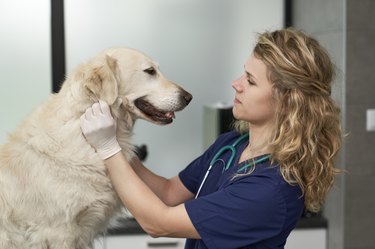Causes and Treatment of Fluid in A Dog's Lungs (Pulmonary Edema)
We spoke with Dr. Ingrid Taylor, a veterinarian with 16 years of experience in general clinical and emergency practice and public health, to find out about fluid in a dog's lungs, known as pulmonary edema and sometimes called "water on the lungs." "If your dog is showing signs of respiratory distress, this is an urgent situation that must be seen by a veterinarian right away," Dr. Taylor says. "This is a serious health condition that can be life-threatening if not treated quickly."

Video of the Day
"Pulmonary edema can be tricky to diagnose, as many of the signs and symptoms of pulmonary edema mimic the symptoms of other respiratory abnormalities," explains Dr. Taylor. While respiratory issues can have many causes, including a reaction to allergens, any medical condition that causes respiratory issues requires a trip to the veterinarian for immediate evaluation and treatment.
Video of the Day
Causes of pulmonary edema in dogs
Pulmonary edema refers to the buildup of fluid in the lungs. "Pulmonary edema occurs when air sacs within the lungs called alveoli fill with fluid instead of air," says Dr. Taylor. This interferes with oxygen and carbon dioxide exchange between the lungs and the circulation. This excess fluid in the lungs affects how well your pet can breathe, and it can lead to death if not treated appropriately and aggressively. Fluid in the lungs in dogs can build up gradually, or it can happen very quickly.
"There are two main causes of pulmonary edema," says Dr. Taylor. "One is cardiogenic, caused by congestive heart failure stemming from diseases like hypertrophic cardiomyopathy, dilated cardiomyopathy, mitral valve disease. The other is noncardiogenic, caused by issues not originating from a heart condition." These issues include drowning, choking, tracheal collapse, brachycephalic syndrome, trauma, seizures, electrocution, upper airway obstruction, and anaphylaxis and toxins, and other causes. "Pulmonary edema is life-threatening and requires diagnosis and treatment right away."
Noncardiogenic pulmonary edema is caused by issues not originating from a heart condition, including drowning, choking, tracheal collapse, brachycephalic syndrome, trauma, seizures, electrocution, upper airway obstruction, anaphylaxis, and toxins, among other causes. Pulmonary edema is life-threatening and requires diagnosis and treatment right away.
Since the presence of fluid in the lungs has various causes, only a veterinarian can establish which one is causing the problem in your pet. A common cause of water in the lungs is chronic valve disease, but other heart problems can lead to pulmonary edema. Other causes include trauma, acute lung injury, smoke inhalation, drowning, and underlying lung disease.

Treatment and diagnosis of pulmonary edema in dogs
"The diagnosis of pulmonary edema requires a physical exam, history, X-rays and ultrasound, bloodwork, and other tests as needed to identify underlying causes," says. Dr. Taylor.
Ultimately, the type of treatment will depend on the cause and the severity of the problem. Treatment to address your dog's condition might include a low sodium diet, diuretics, or other medication to help release fluids from the lungs as well as oxygen therapy to help open the airways and help your pet breathe easier. Antibiotics, intravenous fluids and colloids, diuretics, and anti-inflammatories are also common treatments for dogs suffering from noncardiogenic pulmonary edema.

Watch your dog for difficulty breathing
One of the most common symptoms of pulmonary edema is difficulty breathing. Dogs with water in the lungs often make unusual sounds, such as wheezing or crackling, when they breathe. They may experience coughing and an increased respiratory rate, which might look like your dog is making an effort to breathe. Other symptoms include panting, rapid breathing, and open-mouth breathing, notes Dr. Taylor.
"Signs of pulmonary edema can come on quickly or over time, depending on the underlying cause," says Dr. Taylor. "If your dog exhibits any behavioral or other changes, getting those checked out right away by a veterinarian and attending regular exams and check-ups can help identify problems early if the pulmonary edema is a gradual progression."
Other signs to look for in your dog
"Some dogs with pulmonary edema will also show weakness, exercise intolerance, and lethargy," says Dr. Taylor. They might even collapse. These are especially common after walking, playing, or being involved in some sort of physical activity. "Fluid build-up in the lungs prevents oxygen from circulating in the bloodstream and getting to the body's tissues," says Dr. Taylor. "This is an immediate emergency if you see this."
The bottom line
Pulmonary edema, or an accumulation of fluid in the lungs, is a serious condition that requires immediate veterinary care. This can be deadly if not treated quickly, so if your dog shows symptoms such as difficulty breathing, wheezing, crackling sounds while breathing, weakness, lethargy, or collapse, you should seek care from your DVM right away. A full medical workup is needed to diagnose pulmonary edema, and there are a variety of treatments that may help, including medications and oxygen therapy.